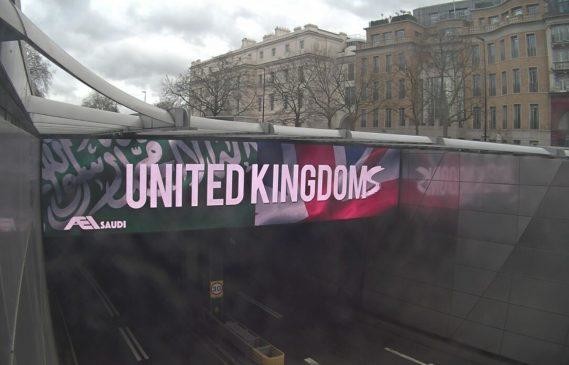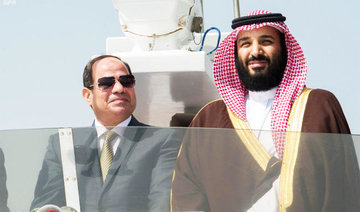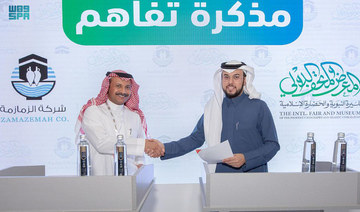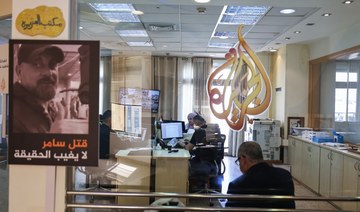LONDON: Saudi Arabia’s Crown Prince Mohammed bin Salman has left Cairo en route to the UK for an official three-day visit. In a statement, the Saudi Press Agency said the Saudi royal is expected to hold discussions with the Prince of Wales, Prime Minister Theresa May, and other officials on world issues and ways to improve bilateral relations.
Prior to his arrival, billboards highlighting Saudi Arabia’s Crown Prince Mohammed bin Salman first visit to London as heir to the throne, have appeared on the city’s streets, as reported by Saudi state-news channel Al-Ekhbariya.
The visit is expected to focus on defense, security and economic ties. The two sides will also review key bilateral and regional issues.
Saudi crown prince heads to UK for official visit
Saudi crown prince heads to UK for official visit

PIF-owned helicopter firm eyes global expansion and IPO, says CEO

RIYADH: Saudi Arabia’s Public Investment Fund-owned commercial chopper operator, The Helicopter Co., is eyeing a global footprint and an initial public offering, revealed its CEO.
Speaking to Arab News on the second day of the Future Aviation Forum in Riyadh, Arnaud Martinez explained that once the company solidifies its position in the Saudi market, it will seek avenues to expand and grow its business.
This aligns with the Saudi sovereign fund-owned firm’s goal to generate long-term commercial returns and activate new sectors in the Kingdom that support the realization of Vision 2030.
Martinez said: “Now, the market, the aim is not only KSA, right? There is something else than just KSA. We couldn’t go over and beyond the borders until we are securing our own market.”
He added: “But once you secure the market, it’s a healthy, again, move to go and see what’s going on in other countries, other continents, and other bids. That’s what PIF does; we invest, we create something that the Kingdom needs, we grow the business, then you go on, you grow, you go over the borders, and then you go on an IPO journey.”
During the interview, Martinez also shed light on how the Kingdom’s aviation market needs to be flexible and responsive to meet ongoing demand.
“The agility, the reactivity is needed in the Saudi market. I cannot wait and wait to have a contract, wait to have a request from the client and say: wait for two years, wait for three years, I will bring you the assets, I will bring you the helicopter; we cannot do that,” the CEO stressed.
“I need to plan and be agile. We have done that in the past five years. We only bring the aircraft that the Kingdom needs. I don’t buy aircraft because I love buying aircraft; we buy aircraft because we need aircraft,” he further emphasized.
Moving on to the role of THC, Martinez underlined that the firm’s role is very different from five years ago.
“The role five years ago was mainly to serve as an air mobility solution. The giga-projects, the famous giga-projects that we are talking about — rightly so, because they are fantastic projects: Red Sea Global, Amaala, NEOM, Qiddiya — all these projects were the core of the THC setup five years ago,” the CEO affirmed.
“Now the scope is way different five years later. One of our key segments, really close to my heart, is how we impact the lives of the people by saving lives. So, we have a massive segment, with our partner, Saudi Red Crescent, and we are working really hard to provide emergency services to the Saudi population,” he underscored.
Martinez also added, “The next five years will be as exciting as the past five years, maybe more.”
The CEO continued to stress that in the upcoming years, THC needs to continue growing its medical services support, as well as its contribution to hospitality and tourism.
He also added in that regard, “It’s time to see in the following few years what is abroad the border, right, overseas. You cannot be only a national champion; you want to be a regional leader in the worldwide plane. That’s the next wave, next step.”
To support the firm in its plans, THC also seeks to invest in new technology, Martinez disclosed during the interview.
With regards to having fully electric helicopters, the CEO said: “The platform is ready. The helicopter platform is not the issue. It’s the readiness of the ecosystem, the regulation, the infrastructure, the airspace, so many key elements around that. The platform, the helicopter is the easy piece.”
Speaking on the Future Aviation Forum, Martinez noted: “The airshows are always a good opportunity for me to sit with people who have 50, 60, 70 years legacy, which I don’t have.”
“We are 100 percent owned by PIF and part of that portfolio of aviation. So, this forum is always a good opportunity for us to meet with the ecosystem. We are not alone and growing alone. We are growing with many support services,” Martinez added.
More than 5,000 global aviation industry experts, international airline leaders, and airport executives are expected to convene at the Future Aviation Forum.
Organized by the General Authority of Civil Aviation, the three-day event will feature discussions on issues related to the global flight sector, air transport, and environmental sustainability in civil aviation, as well as talks on enabling advanced air transport and enhancing global connectivity.
The event also aligns with the Kingdom’s ambition to become a leader in the sector within a decade, including securing $100 billion worth of investments by 2030.
UNRWA says food distribution in Rafah suspended due to insecurity

- Food distribution in Rafah suspended due to lack of supplies and insecurity
DUBAI: The UN agency for Palestinian refugees (UNRWA) said on Tuesday that food distribution in Gaza’s southern city of Rafah were currently suspended due to lack of supplies and insecurity.
Simultaneous Israeli assaults on the southern and northern edges of the Gaza Strip this month have caused a new exodus of hundreds of thousands of people from their homes, and sharply restricted the flow of aid, raising the risk of famine.
Pakistan approves petrol, diesel supply agreement between Saudi Aramco, GO Petroleum

- Under the agreement, Aramco will meet GO Petroleum’s petrol, diesel demand for its outlets in Pakistan
- Pakistan last month approved the Saudi oil giant’s move to acquire a 40 percent stake in GO Petroleum
KARACHI: The Competition Commission of Pakistan (CCP) has granted a time-bound exemption on relevant clauses of a product supply agreement between Saudi oil giant Aramco and Gas & Oil Pakistan Ltd. (GO Petroleum) for the import and sale of petrol and diesel products to Pakistan, the CCP said on Tuesday.
Aramco Trading Company (ATC) Fujairah FZE Ltd. is one of the world’s largest integrated energy and chemicals companies, while GO Petroleum is an oil-marketing company (OMC) registered in Pakistan that operates a network of retail outlets across the country that sell petrol, diesel and lubricants.
Under the agreement, ATC Fujairah intends to meet GO Petroleum’s demand for essential petroleum products for its outlets, which primarily includes petrol and diesel.
“The parties submitted to the CCP that this arrangement is expected to achieve economies of scale in procurement for GO Petroleum, potentially resulting in better prices for Pakistani consumers,” the CCP said in a statement.
“The exemption sought was on exclusivity aspects of the commercial agreement to supply 100 percent demand of imported products for GO Petroleum’s retail outlets. The CCP has accordingly granted exemption on the product supply agreement with certain conditions included therein.”
The CCP grants exemptions pursuant to Section 9 of the Competition Act, 2010, ensuring that such exemptions have economic benefits that outweigh anti-competitive effects.
“The CCP’s conditions stipulate that both parties must refrain from engaging in anti-competitive activities. Importantly, the exemption does not include approval on any pricing terms and mechanisms related to the products,” the CCP statement read.
“Additionally, as the agreement has referred to certain off specification products, however approval of concerned sector regulator should be ensured for import and sales. The applicants have also been directed to ensure required approvals on their terminals and storage facilities by relevant authorities to be used in the execution of this agreement.”
Subject to the conditions, the CCP said, it had granted the exemption until June 2026 and both applicants could approach it for an extension with required details and also identifying the benefits that have accrued to the improved distribution network of petroleum products and enhanced competition in the market.
Last month, the CCP approved Saudi oil giant Aramco’s move to acquire a 40 percent stake in Go Petroleum, officially marking the Saudi company’s entry into Pakistan’s fuels retail market.
The CCP said it had authorized the merger after determining the acquisition would not result in the acquirers’ “dominance” in the relevant market post-transaction. The acquisition would help bring much-needed foreign direct investment in Pakistan’s energy sector, contributing to economic growth and development of the country, it added.
In February 2019, Pakistan and Saudi Arabia inked investment deals totaling $21 billion during the visit of Saudi Crown Prince Mohammed bin Salman to Islamabad. The agreements included about $10 billion for an Aramco oil refinery and $1 billion for a petrochemical complex at the strategic Gwadar Port in Balochistan.
Both countries have lately been working to increase bilateral trade and investment, and the Kingdom recently reaffirmed its commitment to expedite an investment package worth $5 billion.
300 tons of Zamzam supplied daily in Madinah

- To ensure that Zamzam water is safe, a specialized technical staff takes more than 80 samples daily and examines them with the latest equipment
RIYADH: The General Authority for the Affairs of the Grand Mosque and the Prophet’s Mosque exerts all efforts to provide Zamzam water at the Prophet’s Mosque so that worshippers and visitors can enjoy the blessed water.
The authority supplies 300 tons of Zamzam water, brought daily from Makkah to the mosque in Madinah on bowsers equipped for this purpose, the Saudi Press Agency reported.
To ensure that Zamzam water is safe, a specialized technical staff takes more than 80 samples daily and examines them with the latest equipment.
Meanwhile, Zamazemah Co. and the Coordination Council for Institutions and Companies Serving Domestic Pilgrims (Mutahed) signed a memorandum to provide Zamzam water bottles to domestic pilgrims during Hajj.
Deputy Minister of Hajj and Umrah Dr. Abdulfattah Mashat attended the signing. This agreement aims to ensure high-quality services for pilgrims.
Israeli officials seize AP equipment and take down live shot of northern Gaza, citing new media law

- Authorities accuse AP of providing images to Al Jazeera
- The seizure followed a verbal order Thursday to cease the live transmission, which the news organization refused to do
JERUSALEM: Israeli officials seized a camera and broadcasting equipment belonging to The Associated Press in southern Israel on Tuesday, accusing the news organization of violating a new media law by providing images to Al Jazeera.
The Qatari satellite channel is among thousands of clients that receive live video feeds from the AP and other news organizations. The AP denounced the move.
“The Associated Press decries in the strongest terms the actions of the Israeli government to shut down our longstanding live feed showing a view into Gaza and seize AP equipment,” said Lauren Easton, vice president of corporate communications at the news organization. “The shutdown was not based on the content of the feed but rather an abusive use by the Israeli government of the country’s new foreign broadcaster law. We urge the Israeli authorities to return our equipment and enable us to reinstate our live feed immediately so we can continue to provide this important visual journalism to thousands of media outlets around the world.”
Officials from the Communications Ministry arrived at the AP location in the southern town of Sderot on Tuesday afternoon and seized the equipment. They handed the AP a piece of paper, signed by Communications Minister Shlomo Karhi, alleging it was violating the country’s foreign broadcaster law.
Shortly before the equipment was seized, it was broadcasting a general view of northern Gaza. The AP complies with Israel’s military censorship rules, which prohibit broadcasts of details like troops movements that could endanger soldiers. The live shot has generally shown smoke rising over the territory.
The seizure followed a verbal order Thursday to cease the live transmission — which the news organization refused to do.
“In accordance with the government decision and the instruction of the communications minister, the communications ministry will continue to take whatever enforcement action is required to limit broadcasts that harm the security of the state,” the ministry said in a statement.
Israeli officials used the law to close down the offices of the Qatar-based broadcaster on May 5 as well as confiscating the channel’s equipment, banning its broadcasts, and blocking its websites.
Israel has long had a rocky relationship with Al Jazeera, accusing it of bias against the country. Israeli Prime Minister Benjamin Netanyahu has called it a “terror channel” that spreads incitement.
Al Jazeera is one of the few international news outlets that has remained in Gaza throughout the war, broadcasting scenes of airstrikes and overcrowded hospitals and accusing Israel of massacres.
The war in Gaza began with a Hamas attack in Israel that killed 1,200 people and saw 250 others taken hostage. More than 35,000 Palestinians have been killed since then, according to Gaza’s Health Ministry, which doesn’t distinguish between civilians and combatants in its count.



















